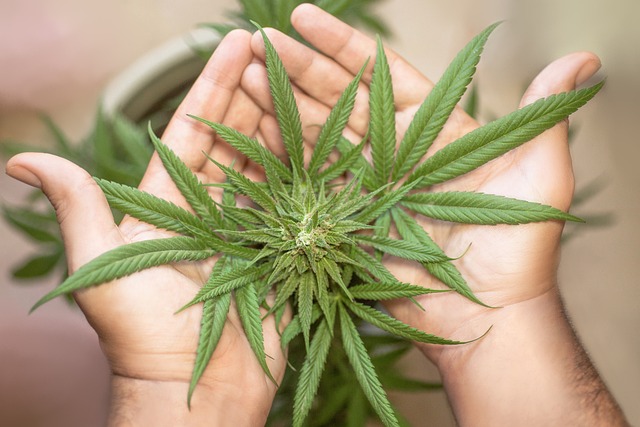Delta 9 THC's legality in the European Union is a complex issue, with each country within the EU setting its own policies under the umbrella of EU regulations. While Delta 9 THC is generally a controlled substance and subject to strict regulations, it can be legal in certain EU countries, especially when derived from hemp containing less than 0.2% THC on a dry weight basis and regulated under the EU's Industrial Hemp Directive. The European Commission, along with national regulatory bodies, continuously updates its stance on Delta 9 products, influenced by the World Health Organization's suggestions for medical use and the EU's Novel Food Regulation. As of early 2023, users are advised to start with a low dose of Delta 9 THC gummies, typically 5-10 milligrams, to assess individual tolerance. It's important for consumers to purchase from credible sources that provide third-party lab results and adhere to country-specific laws and EU regulations. The market for Delta 9 products in the EU is evolving rapidly, with a focus on safety, quality control, and transparency, as regulatory frameworks become more harmonized across member states. The future of Delta 9 THC's legal status within the EU hinges on compliance with the European Medicines Agency, scientific research, and legislative evolution, all aimed at ensuring consumer safety and public health.
Exploring the nuanced landscape of Delta 9 gummies within the European Union, this article serves as a comprehensive guide for consumers and enthusiasts alike. We’ll navigate through the legal status of these products, ensuring readers are well-informed about Delta 9 THC in EU countries. From understanding the regulatory framework to safely sourcing and using Delta 9 gummies, this piece covers essential aspects like dosage and effects, emphasizing the importance of quality control for consumer safety. Additionally, we’ll explore the evolving legal trends and future implications for Delta 9 products in Europe, shedding light on compliance, research, and legislative developments shaping this industry.
- Understanding Delta 9 THC: A Legal Perspective in EU Countries
- Sourcing Delta 9 Gummies Legally within the EU Framework
- Dosage and Effects: Navigating Delta 9 Gummies for First-Time Users
- Quality Control: Assessing the Safety and Purity of Delta 9 Gummies in the EU Market
- The Future of Delta 9 Products in Europe: Compliance, Research, and Legislation Trends
Understanding Delta 9 THC: A Legal Perspective in EU Countries

Delta 9 tetrahydrocannabinol (THC) is one of the most well-known compounds in the cannabis plant, renowned for its psychoactive properties. In the context of EU countries, the legal status of Delta 9 THC varies across member states due to differing interpretations and implementations of European Union regulations. The primary regulatory framework governing such substances is the European Commission’s Novel Food Regulation, which outlines criteria for products that were not consumed as food before May 15, 1997. Delta 9-containing products are considered novel foods in the EU, and their legal use hinges on authorization from the European Commission.
Navigating the legality of Delta 9 THC in EU countries requires a close examination of national laws as well as the broader framework set by the World Health Organization (WHO), which has provided guidance on cannabis and its derivatives, including Delta 9 THC. The WHO has stated that pure Delta 9 THC should not be scheduled globally, provided it is abused or used for medical purposes. However, member states retain the right to set their own policies within the bounds of EU law. As such, consumers and manufacturers must stay informed about the evolving legal landscape in each country, as compliance with both national and EU regulations is paramount when dealing with Delta 9 THC-infused products. It’s essential for businesses and individuals alike to monitor legislative changes closely, as the legal environment for these substances remains dynamic and subject to change.
Sourcing Delta 9 Gummies Legally within the EU Framework

Navigating the legal landscape of Delta 9 gummies within the European Union can be a complex task due to varying regulations across member states. However, understanding the EU’s legal framework is crucial for consumers and vendors alike. As of my knowledge cutoff in early 2023, Delta 9 THC, or tetrahydrocannabinol, is a controlled substance under the European Union’s Narcotic Drugs Act. This means that while the sale and possession of Delta 9-containing products are restricted, there are specific exceptions where Delta 9 can be legal within the EU. These exceptions often involve products derived from hemp that contain no more than 0.2% Delta 9 THC on a dry weight basis. Consumers interested in legally purchasing Delta 9 gummies should seek products sourced from industrial hemp that comply with this threshold and are sold by entities licensed under the EU’s Industrial Hemp Directive. Additionally, country-specific regulations can further dictate legality, so it is imperative to verify the local laws where the product is being purchased or consumed. The EU’s regulatory environment is subject to change, as evidenced by past revisions of the Novel Food Regulation, which has implications for cannabinoid products. Therefore, staying informed about the latest updates from the European Commission and national regulatory bodies is essential when considering the legal sourcing of Delta 9 gummies within the EU. Always prioritize purchasing from reputable sources that provide third-party lab results to ensure product legitimacy and safety.
Dosage and Effects: Navigating Delta 9 Gummies for First-Time Users

When embarking on the experience of Delta 9 gummies for the first time, understanding the right dosage and the effects they induce is paramount. As with any cannabinoid product, individual reactions to Delta 9 THC can vary significantly, making it essential to start with a low dose to gauge one’s tolerance. In EU countries where Delta 9 is legal, regulatory bodies often provide guidelines on safe consumption; typically, a single gummy containing a minimal amount of Delta 9 (around 5-10 milligrams) is recommended for novices. This conservative approach allows users to incrementally assess their response before considering an increase in dosage. The effects of Delta 9 THC can range from a mild euphoria and relaxation to more intense psychoactive experiences, depending on the individual’s physiology and the potency of the gummy. It’s advisable to consume Delta 9 gummies in a familiar, comfortable setting and to avoid operating heavy machinery or driving under their influence. As with any substance, it’s crucial to adhere to the legal limitations and dosage guidelines specific to one’s jurisdiction within the EU to ensure a safe and enjoyable experience.
Quality Control: Assessing the Safety and Purity of Delta 9 Gummies in the EU Market

Delta 9 gummies have gained popularity across the European Union as a discretionary and palatable way to consume cannabinoids, with particular focus on delta 9 tetrahydrocannabinol (THC). As these products become more mainstream, the importance of quality control in ensuring their safety and purity cannot be overstated. In the EU market, stringent regulations govern the production, distribution, and sale of such products to safeguard consumer health. These regulations mandate that delta 9 gummies must comply with the EU’s Novel Food Regulation, which requires thorough risk assessments and safety evaluations before they are legalized in EU countries. Manufacturers are tasked with implementing rigorous testing protocols to verify the accuracy of THC content, the absence of contaminants like pesticides or heavy metals, and the absence of adulterants. This commitment to quality control extends beyond mere compliance; it is a testament to the industry’s dedication to responsible consumer offerings within the legal framework established by EU member states.
Furthermore, the transparency of the supply chain from hemp cultivation to the final product plays a critical role in upholding the integrity of delta 9 gummies on the EU market. Consumers are increasingly aware and vigilant about the products they ingest, making it imperative for manufacturers to provide detailed information regarding sourcing, production processes, and third-party lab test results. This level of transparency is not only a best practice but also a legal requirement under the EU’s General Product Safety Directive. By adhering to these standards, manufacturers reinforce the trustworthiness and legality of delta 9 gummies in EU countries, ensuring that consumers have access to safe, pure, and reliable products within the evolving regulatory landscape.
The Future of Delta 9 Products in Europe: Compliance, Research, and Legislation Trends

As the European market continues to evolve, the landscape for Delta 9 products is becoming increasingly defined with respect to compliance, research, and legal status. The varying legalities across different EU countries have created a complex framework that producers and consumers alike navigate carefully. Currently, Delta 9 tetrahydrocannabinol (THC) remains a controlled substance in most European Union nations under the auspices of the European Monitoring Centre for Drugs and Drug Addiction (EMCDDA). However, attitudes towards cannabis are shifting, and some EU countries have taken steps to legalize medical cannabis, which includes Delta 9 products, paving the way for potential broader acceptance.
The future of Delta 9 products in Europe hinges on a trifecta of compliance, research, and evolving legislation. Compliance with the stringent regulations set forth by the European Medicines Agency (EMA) is paramount for any Delta 9 product to be legally sold. Research into the efficacy and safety of these products is also critical, as it informs policymakers and influences future legislative decisions. The EU’s commitment to rigorous scientific investigation will play a significant role in shaping how Delta 9 products are received and regulated. As legislation continues to adapt to the growing body of research, we can expect to see a more harmonized approach to the regulation of these substances across the EU, with an emphasis on ensuring consumer safety and public health. The trajectory suggests a gradual liberalization of policies towards Delta 9 products, provided that robust evidence supports their legalization for various uses within the continent’s diverse regulatory environment.
In wrapping up our exploration of delta 9 gummies within the context of EU countries, it’s clear that users can partake in these products legally and responsibly under the current framework. Prospective consumers are advised to approach delta 9 THC with caution, adhering to recommended dosages and prioritizing sourcing from reputable vendors to ensure safety and purity. As legislation continues to evolve, it’s imperative for both producers and users to stay informed on compliance requirements and emerging research. The future of delta 9 products in Europe holds promise for a more regulated and transparent market, with the potential to offer benefits while minimizing risks. Those interested in exploring delta 9 gummies should do so with due diligence and an awareness of the legal landscape as it stands in their respective EU country.
